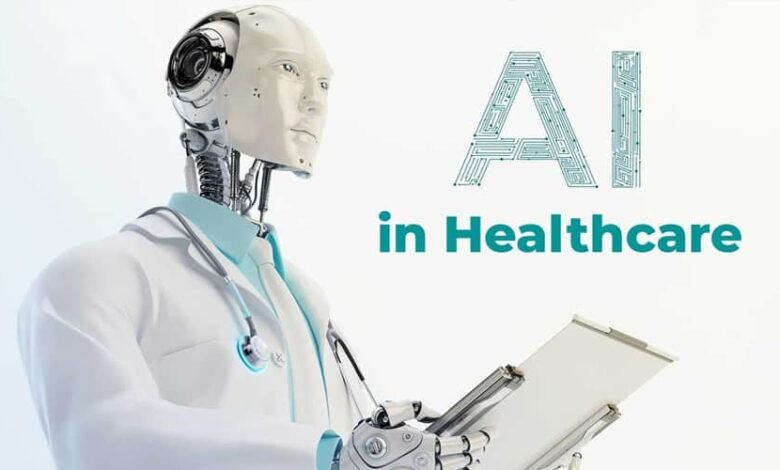
The Rise of AI in Healthcare
The growing complexity and volume of data in healthcare are driving the increasing application of artificial intelligence (AI) in the field. Different types of AI are already being used by healthcare providers, insurers, and life sciences companies. Key applications of AI include diagnosis and treatment recommendations, patient engagement and adherence, and administrative tasks. Although AI can perform many healthcare-related tasks as well as, or even better than, humans, certain implementation challenges will prevent the large-scale automation of healthcare professional roles for the foreseeable future. Ethical concerns surrounding AI in healthcare are also being widely discussed.
AI technologies are becoming more prevalent in business and society, and their application to healthcare is just beginning. These technologies have the potential to revolutionize patient care and streamline administrative processes within provider, payer, and pharmaceutical organizations.
Several research studies have demonstrated that AI can match or exceed human performance in critical healthcare tasks, such as diagnosing diseases. For example, AI algorithms are now outperforming radiologists in detecting malignant tumors and assisting researchers in constructing cohorts for expensive clinical trials. However, for various reasons, AI is unlikely to replace humans in broad medical domains for many years. In this article, we explore both the potential for AI to automate aspects of care and the barriers to its rapid adoption in healthcare.
Types of AI in Healthcare
AI is not a single technology but rather a collection of various technologies. Most have immediate relevance to healthcare, although the specific tasks and processes they support differ. Below, some key AI technologies significant to healthcare are defined and described.
Machine Learning – Neural Networks and Deep Learning
Machine learning is a statistical method that enables models to “learn” by being trained on data. It is one of the most common forms of AI. According to a 2018 Deloitte survey, 63% of organizations pursuing AI were using machine learning. It is a fundamental technique used across many AI applications.
In healthcare, machine learning is most commonly applied in precision medicine, where it predicts which treatment protocols will work best for individual patients based on their attributes and the treatment context. Most machine learning applications in healthcare rely on supervised learning, which requires a training dataset where the outcome variable (such as the onset of disease) is known.
A more advanced form of machine learning is the neural network, which has been used in healthcare for categorization tasks such as predicting whether a patient will develop a specific disease. Neural networks work by processing inputs, outputs, and the relationships between variables (or “features”) that link inputs to outputs.
Deep learning, the most complex form of machine learning, involves neural network models with many levels of variables. These models can uncover thousands of hidden features, made possible by the fast processing power of modern cloud architectures and graphics processing units. A common healthcare application of deep learning is the identification of potentially cancerous lesions in radiology images. Deep learning is also applied to radiomics, which analyzes clinically relevant features in imaging data that are undetectable to the human eye, particularly in oncology image analysis.
Additionally, deep learning is frequently used for speech recognition and natural language processing (NLP). Unlike traditional statistical analysis, deep learning models are difficult to interpret, as their features are typically meaningless to human observers.
Natural Language Processing (NLP)
Since the 1950s, AI researchers have aimed to make sense of human language, a field known as natural language processing. NLP includes tasks like speech recognition, text analysis, and translation. Two primary approaches to NLP exist: statistical and semantic. Statistical NLP, often powered by deep learning, has improved recognition accuracy significantly in recent years.
In healthcare, NLP is used to analyze unstructured clinical notes, create reports (such as those for radiology), transcribe patient interactions, and facilitate conversational AI systems.
Rule-Based Expert Systems
Expert systems, based on “if-then” rules, were the dominant AI technology in the 1980s and remain widely used, especially in healthcare. These systems have been applied to clinical decision support for many years and are often integrated into electronic health record (EHR) systems.
Expert systems require human experts to create rules in a specific domain. Although they work well up to a certain point, they struggle when there are too many conflicting rules or when the knowledge domain changes, making rule updates difficult. These systems are gradually being replaced by machine learning approaches in healthcare.
Physical Robots
Physical robots are now familiar, with over 200,000 industrial robots being installed each year globally. These robots perform pre-defined tasks, such as lifting or assembling objects, and are used in various environments, including hospitals. Robots have become more collaborative and intelligent, with AI capabilities increasingly integrated into their systems.
In healthcare, surgical robots have been in use since 2000, giving surgeons enhanced capabilities, such as improved precision and visibility. While human surgeons still make critical decisions, robots assist with tasks like making precise incisions and stitching wounds. Robotic surgery is commonly used for procedures such as gynecologic, prostate, and head and neck surgeries.
Robotic Process Automation (RPA)
RPA technology handles structured digital tasks for administrative purposes by mimicking a human user following a script or set of rules. In healthcare, RPA is used for repetitive tasks like prior authorization, patient record updates, and billing. It can also combine with image recognition technology to extract and process data from documents, such as faxes.
Although we’ve described these technologies individually, they are increasingly being integrated. For example, robots are gaining AI “brains,” and image recognition is being combined with RPA. In the future, these technologies may become so intertwined that composite solutions will be the norm.
Ethical Implications
The use of AI in healthcare raises several ethical concerns. Historically, healthcare decisions have been made by humans, and the introduction of intelligent machines to assist or make these decisions presents challenges related to accountability, transparency, consent, and privacy.
One of the most challenging issues to address with current AI technologies is transparency. Many AI systems, particularly deep learning models used for image analysis, are nearly impossible to interpret or explain. If a patient is diagnosed with cancer based on an image analyzed by AI, they will likely want to understand the reasoning behind the diagnosis. However, deep learning algorithms, and even the physicians who use them, may be unable to provide a clear explanation.
Mistakes in patient diagnosis and treatment by AI systems are inevitable, and it may be difficult to assign accountability for such errors. There are also scenarios where patients may prefer to receive sensitive medical information from a compassionate healthcare professional, rather than from an AI system. Additionally, AI algorithms in healthcare may be susceptible to biases, potentially predicting a higher likelihood of disease based on factors such as gender or race, even when those factors are not relevant.
As AI continues to integrate into healthcare, we will face numerous ethical, medical, occupational, and technological changes. It is crucial for healthcare institutions, along with government and regulatory bodies, to create frameworks for monitoring these issues, responding responsibly, and establishing governance mechanisms to mitigate negative outcomes. AI is a powerful technology that will significantly impact society, necessitating ongoing oversight and thoughtful policy for many years to come.
The Future of AI in Healthcare
AI is poised to play a significant role in the future of healthcare. Machine learning, in particular, is the driving force behind the development of precision medicine, a much-needed advancement in patient care. While initial attempts at using AI for diagnosis and treatment recommendations have been challenging, it is expected that AI will eventually excel in these areas. With rapid progress in AI-driven image analysis, it seems likely that machines will routinely analyze most radiology and pathology images. Additionally, speech and text recognition technologies, already in use for patient communication and clinical note-taking, will see expanded applications.
The biggest challenge to AI in healthcare is not the capability of the technology itself, but rather its integration into daily clinical practice. For AI to become widely adopted, it must receive regulatory approval, be integrated into electronic health record (EHR) systems, be standardized so that different products work similarly, be taught to clinicians, be covered by public or private insurance, and be updated regularly in the field. While these obstacles will eventually be overcome, it will take longer than the time needed for the technologies themselves to mature. Consequently, limited AI use in clinical practice is expected within the next five years, with more widespread adoption occurring over the following decade.
It is becoming increasingly clear that AI will not replace human clinicians on a large scale but will instead enhance their ability to provide care. Over time, clinicians may shift to roles that emphasize uniquely human skills, such as empathy, persuasion, and the ability to see the bigger picture. The healthcare providers most at risk of losing their jobs will likely be those who are unwilling to collaborate with AI systems.
Hi I'm Olly, Co-Founder and Author of CybaPlug.net.
I love all things tech but also have many other interests such as
Cricket, Business, Sports, Astronomy and Travel.
Any Questions? I would love to hear them from you.
Thanks for visiting CybaPlug.net!






